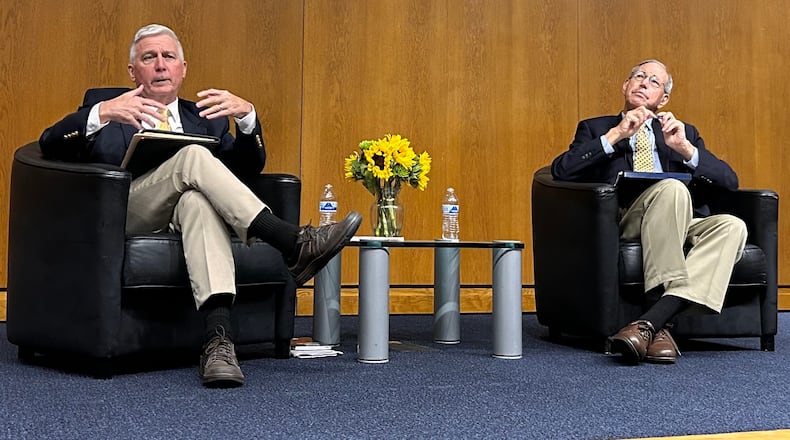Taft is a Republican who joined three other former governors in vocal opposition to Issue 1, and Curtin is a Democrat who testified against the proposals within Issue 1 during the legislative process earlier this year. They represent both sides of the political spectrum, but both oppose the measure for overlapping reasons. Both agreed that a special election in August was not the right time to put Issue 1 on the ballot.
Issue 1, if passed by a simple majority this August, would raise the voter threshold required to pass all future constitutional amendments to 60%, while at the same time requiring citizen-initiated amendments meet signature quotas in all of Ohio’s 88 counties instead of the current 44-county requirement.
Proponents of Issue 1 argue it is necessary to protect the constitution. Opponents, like Taft and Curtin, argue it permanently takes away a chunk of Ohioans’ voting power.
“This is a fundamental change in Ohio’s voting rights,” said Taft, who said he’d be shocked if 30% of registered voters participated in the election this August. “I just think it’s a major mistake to approve or disapprove such a change at the lowest-turnout election that we have.”
Taft, Ohio’s secretary of state for most of the 1990s, called out Frank LaRose — secretary of state and staunch Issue 1 proponent — for flipping his script on August elections. Taft referenced LaRose’s testimony on House Bill 458, a Republican-backed election reform bill passed in December that effectively eliminated August elections, among other things.
In his testimony, LaRose told the House Ways and Means Committee that county August elections bring “embarrassingly low voter turnout,” which he said paves the way for decisions to be made by a handful of voters. “Simply put, an August special election is the last thing election officials should be dealing with as they ready themselves for an important November election that begins with the start of early voting in October. These unnecessary ‘off-cycle’ elections aren’t good for taxpayers, election officials or the civic health of our state. It’s time for them to go!” LaRose said to end his December testimony. He has since stated that the law he was commenting on did not apply to state lawmakers.
Earlier this week, LaRose talked about Issue 1 on Cleveland radio station WHK 1420. He said the constitution should not be used to pass laws and that Issue 1 does nothing to take away the power of citizens to enact laws, as the amendment would not alter the state’s citizen statutory initiative process.
The statutory initiative process requires organizers to get signatures from 44 counties, then give lawmakers a chance to act, and if they don’t then more signatures are required to put the issue on the ballot. Successfully passed citizen-initiated laws can then be overturned by the General Assembly at any point in time.
“All we’re saying is if you want to amend the founding charter of our state, you should build a broad consensus of at least 60% of Ohioans to do that,” LaRose said in his radio appearance.
Taft expressed a different view at this week’s forum in Dayton.
“I would describe this as perhaps the state leaders trying to game the system for whatever reasons they want to,” he said.
The former governor said it is his belief that Issue 1′s proposed signature requirements would make it too hard for any grassroots organizers to get an amendment on the ballot unless they were heavily financially backed. Taft also expressed his concern of how an enacted Issue 1 would limit how often the state could incur debts, which has often been used to complete infrastructure projects.
Curtin told the crowd that he didn’t see why Issue 1 was necessary, given his belief that it’s already sufficiently difficult to get citizen-initiated amendments on the ballot and even harder to get them passed with a simple majority vote. He said that was proven by the state’s historical usage of the citizen-initiated amendment process since it was available in 1913.
“There have been 71 citizen-led initiatives make it to the ballot over those 111 years. Of those 71, 19 were approved,” Curtin said. “It’s difficult to get there and it’s difficult to win.”
A large part of Curtin’s concern with Issue 1 revolves around its proposed changes to the signature gathering process.
“My concern about an 88-county requirement is it enables any one county to essentially veto what the other 87 counties want to do,” Curtin said.
He used Vinton County, the state’s least populated, as an example. Its 13,000 residents represent 1/1000th of the state population, but under Issue 1, signature gatherers would be required to collect signatures that amount to at least 5% of the county’s electors who voted in the most recent gubernatorial election.
Opponents of a particular measure could target such a county, Curtin said, and if successful in thwarting those gathering signatures, would effectively veto what 87 counties in the state support.
Curtin ultimately boiled down his concern to a principled stance against the haphazard way that the proposed reforms within Issue 1 have been brought to the voters.
“In 220 years of statehood, we’ve never made (changes to the constitution) a rush job,” Curtin said. “This is a rush job — that’s my concern. You don’t rush the most fundamental change to our Ohio constitution in 111 years to a special August election designed for minimal voter turnout. You do it for maximum voter turnout so we build consensus.”
About the Author

